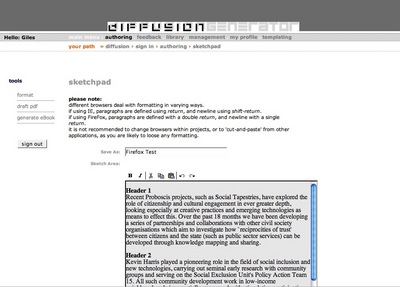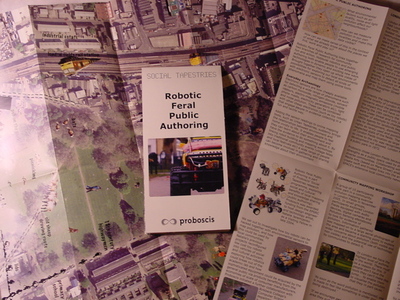A Cultural Snapshot – Public Authoring & Feral Robotics – jointly authored by the project team is now available to download.
Proboscis has also completed a new short film about the project, which we will be presenting at the talk tonight at the Dana Centre.
Update: An 8.1Mb version is now available to download.
A 'Pocket' in Urban Tapestries is the relationship a person make to a geographic place, and which can be filled with text (including HTML tags), audio, images and video clips. The original UT prototype could only create single point pockets (much like sticking a pin into a map), but we have enabled the new system to support multi-point, or polygonal, pockets. Now it is possible to mark off a whole area, such as a building or a stretch of street or a specific feature in the landscape (for instance a pond, fountain or tree). Three types of pocket can thus be created: points, lines and clusters.
What this enables is more complex relationships to places to be articulated, bringing in concepts like time and duration to the mapping of experiences, as well as knowledge and more basic information. The image below shows a Thread with several 'cluster' pockets of Coram's Fields in Bloomsbury. The cluster pockets are of a building (the Foundling Museum), a paddling pool, a cafe seating area, a petting zoo and one of the buildings.
We have also been developing a Flash client for the new UT system: here are some work-in-progress screenshots showing pockets and threads overlaid over Google Maps, retrieving street addresses (from the OS MasterMap geodata) by hovering over the map and displaying pocket contents:
Here is a first preview of one of the new interfaces to Urban Tapestries. In particular, this interface uses Google Maps to provide the mapping visualisation which we have overlaid with the sensor tracks from our Feral Robots test in London Fields back in early February. More details at the presentation on Friday at the Takeaway Festival.
Update: some links to reviews and blog posts on other sites:
Robot Reads London Park
GoRobotics
context weblog
After more than three years of planning and developing we began a small alpha trial this week of the DIFFUSION Generator. This is another pillar of our public authoring concept, enabling people without graphic design skills or access to professional desktop publishing software (such as Quark XPress or Adobe InDesign) to use our DIFFUSION eBooks format as a new form of internet distributed, tactile, on demand publishing.
We plan to test the system thoroughly over the coming months and hope to launch a public beta test of the first version in June. Later in the year we plan to add the Generator's instant publishing capabilities to the new Urban Tapestries system, allowing users to create 'pocket' postcards and 'thread' posters as we proposed last year. In early 2007 we also hope to add the StoryCube template to the Generator, enabling people to publish not just eBooks, but their own StoryCubes as well.
The image below is a screenshot of the sketchpad area of the Generator where people add in their writings and begin to format the text. This is the first of four stages in the eBook publishing process – once the finished eBook is generated the creator has the option to publish it into the DIFFUSION Library alongside all the other titles published since 2000 by Proboscis.

The first of a series of 'maps' about Social Tapestries projects and research has just returned from the printers. We'll be launching it during the Takeaway Festival next week at the Science Museum's Dana Centre. Meanwhile here's a sneak preview of what it looks like:

Proboscis has recently been awarded a grant from the Department of Constitutional Affairs' Innovations Fund – a programme of the Electoral Policy Division. Social Tapestries: Conversations and Connections aims to enhance democratic engagement at local level by stimulating the habits of participation.
The project develops our ongoing collaboration with HIRO and the residents of the Havelock Estate in Southall, west London, where we will be working closely with Kevin Harris of Local Level and Bev Carter of Partners in Change. Over the next 12 months we will be introducing to local residents a range of techniques such as Bodystorming Experiences, and tools such as StoryCubes, DIFFUSION eBooks and the DIFFUSION eBook Generator and, of course, the new Urban Tapestries system now nearing completion.
From our project proposal:
"By stimulating many more interactions and therefore a habit of participation in a low-income neighbourhood where insufficient numbers of people are geared-up to contributing, we expect to develop new forms of engagement with democratic decision-making processes. Our project aims to enable local people to build up an organic and accretive knowledge base of the issues and concerns at the heart of the community. This will encourage the conversations and connections that will engage residents to participate more fully in the democratic processes of managing their estate, relationships with the local authority and more broadly.Our uses of different media, including emerging technologies and more traditional media, are designed to make the visibility and communication of these relationships and the knowledge and information they connect transparent and tangible to the participants in the project. By reflecting the needs and capabilities of the residents in choosing the types of media whereby they can contribute and access knowledge to start building the connections between them, we aim to encourage the widest possible participation.
In developing this project we will also offer a demonstration of the kinds of cross-sector thinking and transdisciplinary methods used by Proboscis and Local Level, and our role as critical intermediaries between people at grassroots and government policy."
One of the key challenges we will be addressing is what counts as democratic participation, who defines this and why. Our aim is to gently propose a richer and broader understanding of what participation can mean (beyond voting in a formal election or residents meeting) by working with different age groups and interests to reflect a variety of strategies for making a difference in the local environment. Specifically we will be focusing on what might be seen traditionally as cultural activities (music, video and image making) as vital and potent forms of democratic engagement.
Kingston University, Knights Park, KT1 2QJ
Thursday 23 March, 6.30pm
I will be participating in an evening seminar on the subject of new forms of social living and participation in suburbia:
"Led by Kingston University's School of Suburban Studies, the evening will include presentations from Melissa Mean of Demos, author of the People Make Places - growing the public life of cities report and Giles Lane, Director of Proboscis, an artist-led creative studio which specialises in community inter-action and innovation.
The seminar will be led by Dr. Nick Hubble, Senior Researcher at the School of Suburban Studies, who will be challenging old stereotypes of the suburbs. In Tomorrow's Suburbs, he will be considering new forms of social networks, drawing upon the latest academic ideas about qualitative research and social capital."
The event forms part of Kingston Council's Think in Kingston programme supported by Kingston University. Further information:
www.kingston.gov.uk/arts
http://proboscis.org.uk
http://fass.kingston.ac.uk/research/centres/suburban_studies/
www.demos.co.uk
Update: Nick Hubble appeared on a BBC Newsnight film about suburbia just a few hours after the event. Kingston University also now has a webpage with presentations.
We've just published a postcard about the Robotic Feral Public Authoring project and updated the website to include the technical documentation as well as the software developed for the robot.
The project is not quite finished yet, we will be publishing a Cultural Snapshot on the ideas and concepts later in March as well as a special fold-out map and a short film about the project. We also hope to complete a second prototype feral robot in time for the project demonstration at the Takeaway Media Festival at the Science Museum's Dana Centre in London, March 27th-31st. The festival is part of the NODE.L season of media arts in London.
Update: a PDF of the Technical Documentation is now available (2.1Mb).